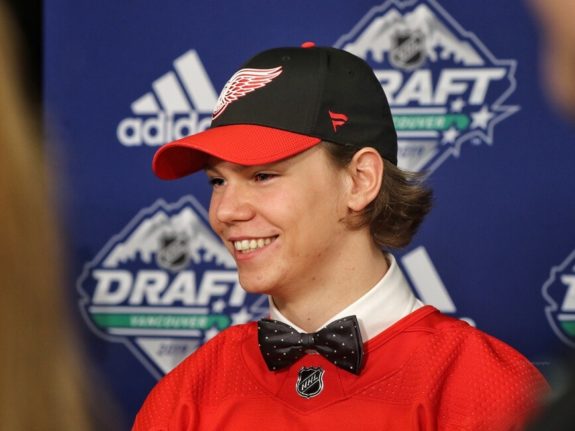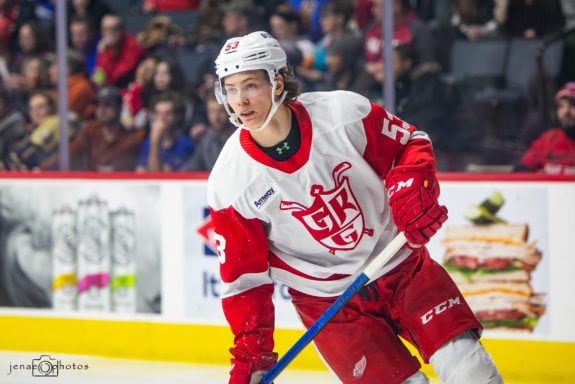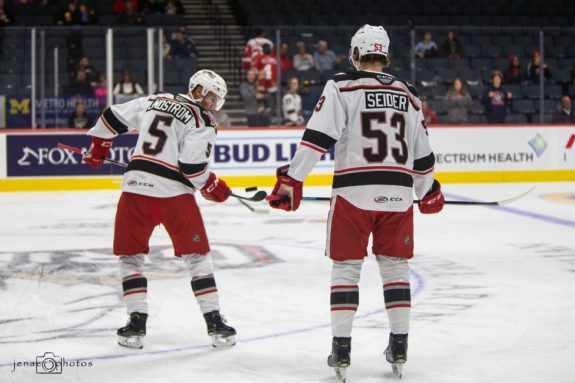It’s no secret that the Detroit Red Wings have had some excellent drafts in recent offseasons. Steve Yzerman took over for Ken Holland in April of 2019, and he started his tenure with a bang. The team had possession of the sixth overall pick in the 2019 Entry Draft, and with his first selection as general manager, Yzerman took German defenseman Moritz Seider. The gasps in the room were distinct, and the draft analysts were flabbergasted with the selection. Even Seider was surprised as the television feed flipped to show him with his mouth gaping open and then covering it with his hands in utter shock. Bob McKenzie ranked him 16th overall, which is still a great place to be, but most, if not all, people believed choosing him at sixth was a huge reach.

Fast forward to 2021, and we see Yzerman take another defenseman with his first pick in the draft. However, this time it was the Swede Simon Edvinsson. He wasn’t a pick that shocked many people, but William Eklund was still on the board, so it was still surprising. We all know the history behind the Red Wings and big Swedish defenseman, so this is just another piece added to a much larger puzzle.
Both of these players possess a unique set of skills. Since Edvinsson was drafted, speculation has been brought up that he will be the top pair for the Red Wings with Seider. The real question(s) ends up being, what can they bring individually, as a unit, and to a team that will continue to develop young talent?
Seider’s Strengths and Weaknesses
Seider won the 2020-21 Elite Prospects award for the top junior player in the SHL, and it was for a good reason. He posted 28 points in 41 games which includes seven goals. He may not score a ton of points, but his defensive play certainly makes up for it.
The first thing that stands out about Seider is his size. He’s a stout 6-foot-4 and 207 pounds. His physical play is bolstered because of it. He isn’t afraid to throw all kinds of reverse hits to defend from pressure on the puck, and he’s willing to push people around low in the zone. His puck protection is not only excellent, but it’s effortless. It takes a lot to push him off, and if you do, you should be pleased with yourself because it doesn’t happen often. His physical play is just a microcosm of what he can do as a player.

After being selected, Seider, in an interview, defined himself as a “smart, two-way defenseman that loves to join the rush and create space for his teammates, but is also not afraid to play the body on the ice.” He’s clearly very self-aware because that’s exactly how most scouts described him. His hockey sense and skating for a kid of his stature are truly extraordinary. In this clip, he opens up and takes the puck down the ice for a possession zone exit and entry. Then, he pushes a backhand pass to his teammate on the right, who drives to the net and almost scores a game-winning goal.
*All clips are from the 2019-20 season with the Grand Rapids Griffins. Seider wears number 53.*
In this next one, Seider receives the puck on the half-wall from a teammate and proceeds to drive to the net. He puts a relatively easy shot on the net and heads back to the blue line, where he gets the puck again. He uses his big strides to make progress to the net, looks like he’s going to take a shot, and deceptively puts it to the front where his teammate misses it entirely.
Those two clips represent a lot of what Seider does well in the offensive zone. He’s extremely mobile both on the rush and in the offensive zone, and he’s not afraid to take the shot when the lane is open. Of course, he is a bit more pass-first than a shooter, but he creates space using his frame and skating, which results in tons of chances. He’s efficient in his motions, and he has shown on many occasions that he can anchor an offense at even-strength and on the powerplay.
His defense is the more underrated part of his game. He reminds me a lot of Boston Bruins defenseman Charlie McAvoy in that he’s a good skater with great edges that can create offense and possesses excellent stick skills and hockey sense on the defensive side. In this clip, he sits back patiently as the opposition breaks into the zone. He then forces himself onto the player with the puck, who forces the pass to the middle. Seider subsequently blocks it and battles with the player until he kicks the puck to his stick and retreats with possession.
Seider’s hand-eye coordination and ability to anticipate plays to the middle after pressuring the puck is an excellent skill to have at such a young age. It shows maturity in his game, and defensemen must have that trait. For fun, here’s a clip where he absolutely demolishes John Quenneville, who is trying to force his way to the net. He is patient and retreats to open up options.
He’s the total package. Seider’s ability to maintain a solid gap and understand when to jump up in the play after making a good read is far and away some of the best I have seen from a young blueliner. There aren’t very many weaknesses to his game, if any at all. He may have been a reach to most at sixth overall, but he’s proving Yzerman and the Red Wings scouting staff correct.
Edvinsson’s Strengths and Weaknesses
Edvinsson is an interesting player. Like Seider, the Red Wings picked him sixth overall, and he has a huge frame. He stands at 6-foot-5 and weighs 207 pounds, and when you’re watching him, it seems like he needs to grow into his frame. Putting on some more muscle for that size wouldn’t hurt. As far as numbers go, he had a minimal sample in the Swedish Hockey League (SHL), playing a mere 10 games and registering one point. However, he played 14 games apiece with Västerås IK in HockeyAllsvenskan and Frölunda HC J20 in the J20 Nationell leagues with five and six points respectively. He also played at the World Under-18 Championships, where he posted four points in seven games.
In terms of breaking him down as a player, Edvinsson’s biggest strength is his skating. With his size, you can rarely find someone who moves on his edges when faced with pressure as he does. He knows when to jump into the rush and also when to pull back and reset. He doesn’t have a very high top speed, which is understandable for a player with his stature, but his long strides allow him to get up the ice efficiently. In this clip, Edvinsson (wearing number nine) skates the puck to the edge of the defensive zone and moves it to his left, where his teammate picks it up. He then decides to join the rush and gets the feed from a teammate who picked up the loose puck due to a deflected pass. Edvinsson takes it down the left side and feeds it cross-ice to his teammate for the goal.
His skating, paired with his puck skills, can shine through even in the darkest of times. When he’s struggling, you know he always has that as a fallback. Here is him using that skating to fake out a pressuring opponent and then him saucing a pass to the tape of Bruins prospect Fabian Lysell.
He can clearly move the puck well. However, with great power comes great responsibility, and I don’t think Edvinsson has truly gotten the “great responsibility” part down yet. Have you ever watched an NHL game either in person or on the television and audibly said, “why did you pass that?” or “what in the world was that decision-making?” Well, that’s a lot of what we see with the young Swedish defenseman. His pass decisions can be downright awful, but sometimes they’re very puzzling. There are many times when he just doesn’t read the play well, which results in a turnover. See here:
And here:
He also gets outclassed physically along the boards or when players are trying to slip by him on the rush. He maintains a solid gap at first but then commits and is unable to finish him off.
Another major problem is overplaying or over-stickhandling the puck. Edvinsson is a great skater, and it’s obvious through his ability to transition the puck easily. However, he appears to get too comfortable and then loses the puck while attempting a one-on-one move at the wrong time. See here, as he attempts to bring the puck out by stickhandling through two players and throws it up the ice aimlessly, resulting in a turnover.
Or here when he loses it trying to deke the defender that comes out to pressure him:
It might seem like I’m ragging on him a bit too much when considering the point of this article, but these are all genuine concerns that could hold him back from the top pairing with Seider. He must figure out how to manage the puck and not overdo anything with it. Additionally, he needs to iron out his physical game before he gets to the NHL level. If he doesn’t, teams and players will know that they can take advantage of him on the rush and corner boards. He gets pushed around way too easily, and it’s not going to fly when playing against the best in the world. One final issue is his shot. It’s not the worst in the world, but considering how much he shoots the puck, it’s important that he put some of those attempts on the net. Mindlessly flinging the puck in that general direction does very little for your team.
While there are some legitimate problems with what we’ve seen from him so far, Edvinsson has a lot of untapped talent. He’s shown flashes of many positive things like his skating, passing, and transition offense. He does all of that well as a somewhat freak of nature in the hockey world with his size. He has more to iron out, but he’s a full two years of development behind Seider, so it would be unfair to compare the two. They play relatively different styles of hockey as well.
It’s good that Edvinsson has shown flashes of promise. However, he needs to do it on a more consistent basis. I’m very high on players, especially defenseman, that can think the game at a high level. It’s why Brandt Clarke was my top-rated defenseman of the entire draft. He may not be as skilled as Luke Hughes, but he thinks the game better than many people can. Seider is one of those players, and Edvinsson could be too with time.
What Could We See in the Future?
Both of these players have some excellent upside. At their best, they’re two excellent top pair defenders. Seider is great both ways and can use skating to his advantage with smooth crossovers and great hockey sense. He’s also not afraid to be physical and is a menace in the low boards when battling for loose pucks. Edvinsson is a lanky, offensively inclined player that also has some great skating abilities. He is a bit rawer at this stage of his career, and there are definitely some things he needs to sort out with the speed he processes the game and his play in the defensive zone. However, more time in Sweden and the AHL when he comes to North America will do him tons of good.
Latest Red Wings Content:
- NHL Rumors: Oilers, Red Wings, Flyers
- 9 NHL Teams That Missed in Free Agency
- Why Red Wings’ Quiet Offseason Was the Right Call Long Term
- Red Wings Should Still Pursue John Gibson Trade
- Red Wings’ 10 Hall of Famers on 2002 Stanley Cup Team
The two could make an elite top pair when they hit their primes. They remind me a lot of Dougie Hamilton and Jaccob Slavin or even Roman Josi and Ryan Ellis. Ellis and Slavin read the game extremely well and play the defensive side just as well as the offensive. Slavin, in particular, is rather physical and isn’t afraid to put his body on the line. Seider provides all of those things, and his stature adds another element to the mix.

Josi is not a great defensive player, but he uses his skating to his advantage and has some of the best zone exit and entry numbers in the NHL. Hamilton is a big body that spams the shoot button and is unafraid to jump up in the rush if necessary. Combined, they make up the player that Edvinsson is. Whether he meets those standards in his career will obviously take time, but Yzerman sees something in him, which bodes well for his chances.
These two individuals are already some of the most talented defensemen in any prospect pool across the league. They are still a bit raw with their skills, especially Edvinsson, but as time takes its course, we will see them develop even further. I think every member of the Motown faithful believes these two can develop into a really special tandem on the back end.
